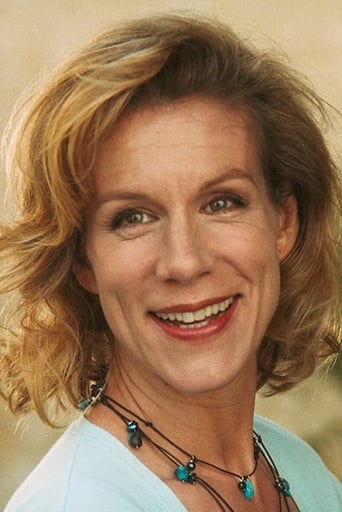robert-temple-1
This is a truly remarkable film, which everyone concerned about troubled young people should see. It is brilliantly written and directed, and the lead performances are stunning. The film's director, producer, two executive producers, novelist (Jacqueline Wilson), script writer (Helen Blakeman), and two lead performers are all female. The production company might therefore more appropriately have been called Sisterhood Productions. Not a single male had anything to do with the production of this film. This could explain the delicate sensitivity of the treatment of this harrowing story, which involves a woman and a girl. The main character is a girl named April Johnson. She is played successively by tiny tot Lucy Hutchinson (aged 5, so surely not the Lucy Hutchinson who wrote the famous memoirs in the 17th century?), Alex Hewett, and Dakota Blue Richards (aged 14, and presumably not a Sioux Indian), though the latter features in the film continuously, and the others only in flashbacks. All of them are marvellous actresses and do a superb job. Richards is miraculous, frankly. She is so convincing that it is hard not to believe she really is that disturbed and tormented girl. The acting sensation of the film is however Juliet Stevenson. She is incredibly and unnervingly convincing as a well-meaning but hopeless spinster teacher who gets everything wrong and is hopelessly out of touch with everyday reality. Considering how sophisticated and intelligent the real Juliet Stevenson is, for her to become this creature is truly amazing. She gets the body language right, is clumsy and hopeless and pathetic as she struggles to do the right thing. The film centres round the relationship between Stevenson and Richards, and they work together so well one would think they had been doing this for years. There are numerous excellent cameos and supporting roles, all done wonderfully well, such as the portrayal by Lizzy Clark of a dippy young girl named Poppy, and Leah Ferguson as the girl Gina who befriends April. The 'care system' in Britain for orphaned or abandoned children is ruthlessly exposed in this film as a shambles, a living horror, a nightmare of unimaginable proportions, a sadistic, unfeeling, punishing ordeal which would crush almost anyone and at the very least leave all of its victims emotional wrecks for life. It is so terrible, so sad, so hopeless, so horrible, that it seems a miracle for the character April even to be remotely sane by the time she has reached 14, when the main story takes place. As if the 'care system', social workers, and the despicable succession of dysfunctional and half-mad foster parents were not bad enough, April has the distinction of having been dumped into a dustbin on the day she was born. Towards the end of the film, she makes her way back to the alley where this happened in order to see the scene of her abandonment and humiliation as a newborn baby. Stevenson, having been a teacher of April, develops maternal feelings for her and takes her in as a foster mother with a difference. For the first time, April has her own bedroom, considerable comfort, plenty of food, and security. She lives in fear of being thrown out or told to move on at a moment's notice, which is all she has known all her life, though Stevenson has no such ideas and keeps reassuring her that the arrangement is permanent and 'this will always be your home'. Having at last made a couple of friends at school, April falls victim (as all teenagers these days do) to the insidious demands of commodity fetishism, in the form of her obsessive need for her own cell phone as a status symbol. But Stevenson is opposed to consumerism and product fetishism, so buys her for her birthday instead of the coveted pink cell phone a beautiful pair of moonstone earrings. These are contemptuously rejected by April, in a spoilt fit, and when she gets to school and her two girlfriends challenge her by asking where is her new pink cell phone (which she over-optimistically had told them she would be getting), she says it is at home charging, and she runs away from school and goes roving around looking for places where she once lived, searching for some feeble semblances of 'roots' or 'origins', and dreaming of meeting her real mother. Like all such kids, she wants to know 'who she is' (don't we all?). Richards conveys all of this with such fierce pride, rage, softness, sensitivity, childlike helplessness, fury, and determination, that she is a sheer Heinz 57 varieties of emotion, all in one exploding can which is blazing out of control and no one seems able to put it out. It is a tour de force performance, like Stevenson's own. Will they, can they, ever love one another as an almost-mother and an almost-daughter? Will April find any roots? Is there a real mother? Is there indeed anything at all to learn or know about a dustbin baby? This is an emotional roller-coaster, done with full authenticity. If it had been a Hollywood film, it would have been ruined by saccharine sweetness, but instead it is done with true grit. None of the young girls simper, nor do they cuddle the camera. Even cute little Lucy Hutchinson who is adorable does not over-act. Nothing is overdone, everything is restrained. The director Juliet May, who seems to have spent her whole life working in television, really does deserve a career in feature films after this triumph. But apart from all the creative achievements, this film is an important human document, and should be as widely seen as possible. I fear, however, that as a BBC TV film which the BBC could not even be bothered to release on DVD themselves (they handed it over to ITV!) this film may never have the extended audience that it should have.
paul david
Wow, what an absolutely lovely movie! Enjoyed every minute of it and as a bloke, had me reaching for paper tissues at the end. A simple story of a young girl who was dumped at birth in the dustbin behind a pizza parlour and after various care homes is eventually brought up for a period by the Teacher from the school, Juliette Stevenson as Marion. this is low budget and typically British and without doubt unmissable with anyone with a child. Juliett as Marion is outstanding and Dakota blue Richards as April is one to watch for the future. I love the moment half way through of the rubbish being used for a artistic 'horse' and will definitely be giving my own teenage children ideas from this one in a positive way. the mobile phone birthday present thing was a good story line and don't miss the shots of hatfield house, the stately home bossed by Marions friend and former home of Elizabeth I. I think the main town featured is Watford but I stand to bed corrected. Two great British movies in the last few days, harry Brown and this one, but totally different kinds of films. keep it away from the American market, this is a quality film to be enjoyed at the cinema or DVD
Jordan (dramakid-1)
When I received a replying letter from Jackie herself, it mentioned there was going to be a drama of Dustbin Baby, so I read the book before watching this. I flew through the book, it was really riveting and with the drama I was equally impressed. Jacqueline Wilson says it was the best adaptation of her work. When I first heard about a character, Elliot, who was not in the book, I was a bit disappointed, but David Haig portrays Elliot brilliantly. Some of the novel was missed out, which was disappointing, but overall the drama was excellent.Dakota Blue Richards plays April well and so does the young actress playing Young April. If you haven't read the book, READ IT. It has some extra bits in it. Still, the drama is great, great, great.It's brilliant that the DVD will be released on 12th January.




